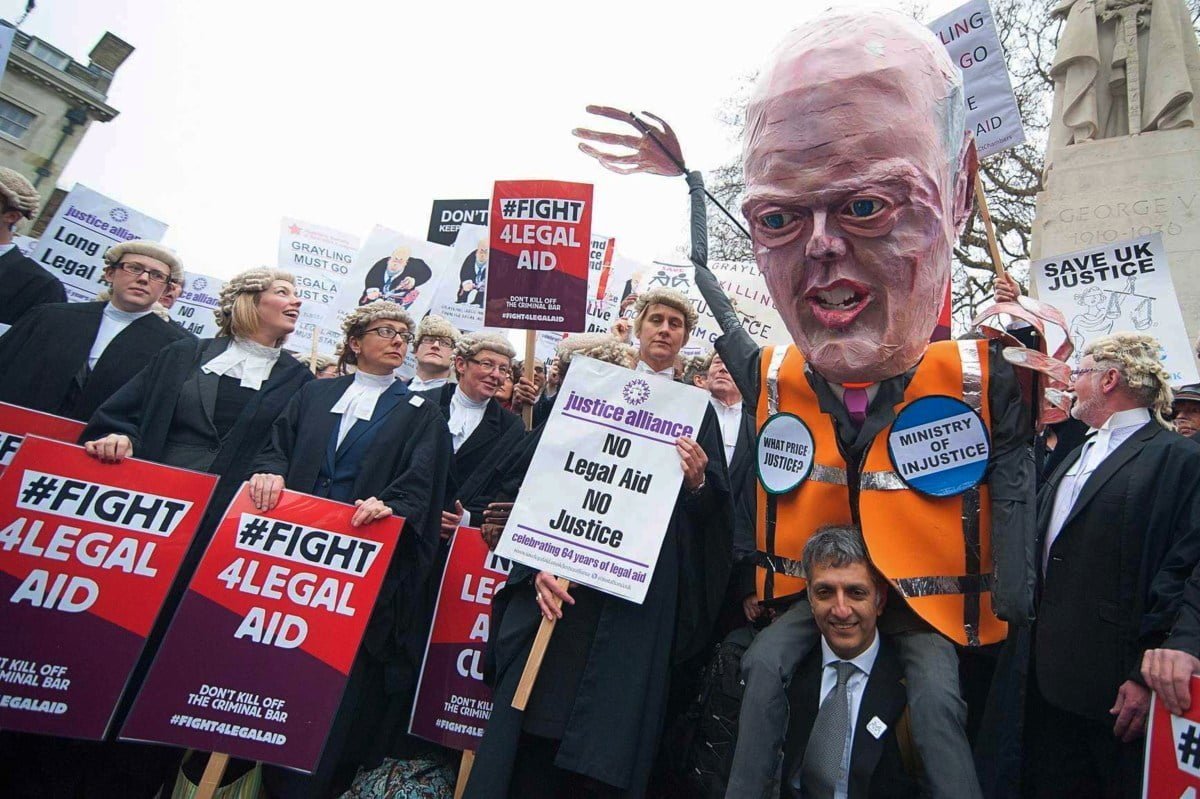Formerly considered a privileged profession, barristers are now organising and taking action against Tory cuts.
Since the start of April, criminal defence barristers have been taking part in escalated industrial action over the ongoing underfunding of the legal aid system.
The number of barrister chambers involved has been growing throughout this action. At the start, roughly 40 chambers were involved. A month later, the figure stands at over 100.
The leaders of the legal profession refuse to call the action a ‘strike’. But that, in reality, is what this is. Barristers have been encouraged to refuse to take on any new criminal legal aid work. And more and more are taking this stance every week.
The impact of this action was limited for the first few weeks. But, as the action continues, the justice system is coming under increasing strain and the pressure is rising for the Tory government.
Impact
Cases involving minor crimes are heard at a magistrates’ court, with the defendant represented by a solicitor (who are not currently part of the strike).
More serious cases, however, require a barrister in the Crown Court. Such cases generally have a several week wait before a hearing. As these latter cases begin to filter through the system, the impact of the action has been revealed.
There have been reports that solicitors are unable to find barristers willing to take on cases. Whilst some more sympathetic judges have been adjourning cases, there have been (unconfirmed) reports from legal aid solicitors on social media and legal websites that other judges are giving them emergency ‘rights of audience’ (the right to present a case in the Crown Court) in order to ensure that defendants have representation.
Many solicitors are reportedly refusing to do this, since they wouldn’t be paid for it. Furthermore, there is the fact that they have not had the same training as barristers in presenting cases in a higher court.
Anger
For many outsiders looking in, the thought of legal professionals going on strike would have seemed unthinkable several years ago.
Barristers have historically been seen as a privileged profession, with high earnings and good job security. But there has been much anger building within the profession over the last few years.
This culminated in a historic strike back in 2014-2015, when legal aid barristers and solicitors refused work for the first time in their history. The leaders of the legal profession ended that strike for no obvious reason, having not even had an offer made to them by the Ministry of Justice. But the anger within the profession has simmered on up to this day. And now frustrations towards a creaking and underfunded justice system and falling living standards have boiled over.
Collapse
The current ongoing action is in response to the Tory government’s ‘reforms’ to legal aid; in particular, the changes to the Advocates’ Graduated Fee Scheme.
The Tory government have claimed that the changes are ‘cost neutral’ (i.e. barristers will not lose out financially). But this is exactly what striking barristers are pointing out: the justice system is extremely underfunded – and the fact that these changes are not accompanied by an increased budget is leaving the justice system on the brink of collapse.
Even before the strike, the signs of this underfunding were laid bare for all to see. For example, several high profile rape trials collapsed back in January due to the failure of the Crown Prosecution Service (CPS) to disclose vital evidence. Many have blamed this failure on the extreme cost pressures facing the justice system.
The pressure from below on the leaders of the legal profession is evident, with Criminal Bar Association (CBA) Chair, Angela Rafferty QC, stating that, “investment across the system is required”. This is in complete contrast to the 2014-2015 strike when the CBA were talking about finding alternative cuts to those proposed.
Cuts
 Although the Fee Scheme changes were the spark for the industrial action, this is far from the sole cause of the frustration and anger felt by legal aid barristers. Sources suggest that the legal aid budget has decreased by an estimated £1 billion since 2005.
Although the Fee Scheme changes were the spark for the industrial action, this is far from the sole cause of the frustration and anger felt by legal aid barristers. Sources suggest that the legal aid budget has decreased by an estimated £1 billion since 2005.
These cuts generally have the greatest effect on junior barristers who have recently entered the profession. Estimates suggest that training to be a barrister can cost up to £127,000. Many junior barristers are therefore in eye-watering debt.
At the same time, their income is being gradually eroded. In London, many new barristers earn as little as £12,000 a year. It is therefore unsurprising that this has culminated in many younger barristers beginning to align themselves with the working class, rather than with the well-off middle-class lawyers elsewhere in the industry.
As the economic crisis continues and living costs rise, even those barristers who were previously opposed to taking strike action are beginning to support the action. In the latest ballot, 2,081 out of 2,317 barristers voted in favour of action.
Escalation
The current direction that the strike will take is uncertain. Yet there have been rumours that the CBA will shortly announce an escalation of the action. This could involve encouraging barristers to refuse to attend hearings for existing cases, putting yet more pressure on the government.
Whether the action is escalated or not, some legal commentators have predicted “chaos” as and when cases begin filtering into the Crown Court system.
Even during the so-called ‘good times’, legal aid work earnt a (well-deserved) reputation as being a ‘public good’, rather than a financial career choice. But the recent attacks on the system have demonstrated that a justice system that everyone can access is yet another reform that capitalism will attack when it can no longer be afforded.
The devastating impact of yet more cuts to legal aid will mean greater uncertainty and delays for defendants; the greater possibility of miscarriages of justice; and barristers being unable to put as much time into cases as they need to, due to the sheer volume of work falling on their shoulders.
Yet these concerns and effects are irrelevant to a system that is driven by profit and exploitation, rather than any genuine desire for fairness, equality, and justice.
The barristers’ strike is beginning to have an impact, adding to the many pressures that the Tory government is already facing. However, this is not a fight that barristers can win alone.
There must be calls for solicitors to join the action, and for the whole legal profession to unionise. Only in this way can legal professions link up with the rest of the labour movement to fight for change across the board and guarantee a fair justice system for all.






